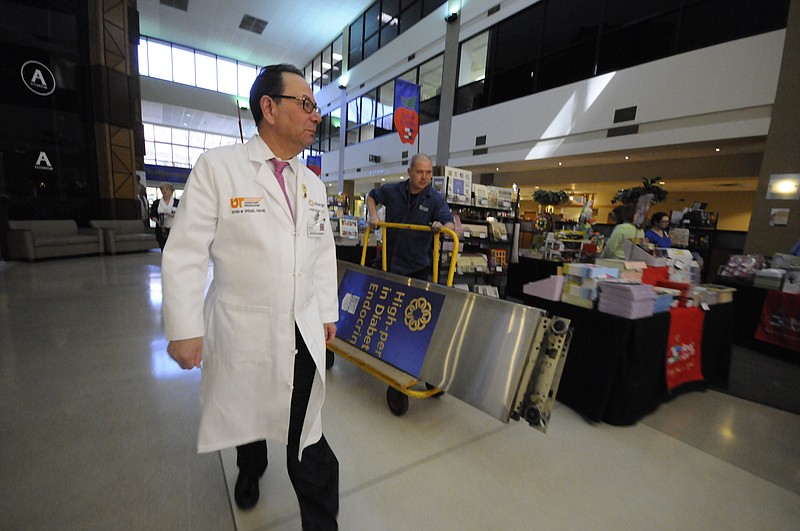We can't see Kevin Spiegel's bottom line, and he's not showing it, but it seems inconceivable that an equitable way cannot be worked out that would allow Erlanger Health System to continue its relationship with the University of Tennessee College of Medicine.
For months, uneasiness has simmered in the relationship, creating tension and uncertainty among teaching faculty at the hospital. Spiegel told this newspaper over the weekend it boiled down to the host teaching hospital losing money when its residents go to other hospitals as part of their regular routine for training.
But the Erlanger CEO also said he'd be willing to drop the issue if there is compensation for the residents. Pair that with a previous offer from CHI Memorial CEO Larry Schumacher to pay for the residents who come there, and it appears all of the pieces are in place for an improved working relationship.
It is our hope such an agreement can be struck in the near future. The region benefits significantly from having a teaching hospital. Not only does the UT College of Medicine increase the number of doctors in the area - doctors who are trained in the most recent techniques and who have access to the most recent research - but studies show patients at teaching hospitals have better outcomes. And many of the residents who do the bulk of their training in Chattanooga remain in the city.
Spiegel clearly has effected a turnaround in the fortunes at Erlanger since his arrival in 2013. At the time, the hospital was suffering from years-long, roller-coaster finances. Indeed, in 2014, he said the hospital was in such a dire position that it had a little more than two months of cash on hand and had cut employee vacation benefits.
"It is possible for Erlanger to close. It just is," he said at the time. "Either there's going to be legislative relief, or there's going to be dramatic changes."
Relief came in various ways, and hospital revenues have grown since then to about $1.2 billion. And the hospital has launched an extensive building program and system expansion plans.
While Erlanger has been affiliated with the University of Tennessee College of Medicine since 1974, the issue of the cost of resident training apparently only surfaced in the past year.
It became official at a board meeting in November when the hospital publicly expressed dissatisfaction with the partnership but did not detail exactly what the issues were at the time.
Then last week, Memorial's board approved a resolution urging Erlanger's board to "vote against any proposal that would limit the approved Chattanooga region training sites for surgical residents, and to engage CHI Memorial in further dialogue to protect access to quality surgical specialties."
Residents, naturally, do most of their training at Erlanger, but specific doctors and certain procedures may precipitate the need for the residents to be in other hospitals like Memorial or HCA Parkridge Medical Center.
What percentage of the residents' training goes on away from Erlanger and how much the health system loses on such training are not clear, but Spiegel evidently thinks it's enough to risk severing the agreement with the UT College of Medicine.
We hope it won't come to that, and we don't believe it has to.
Erlanger has a right to be concerned about the students trained on its campus if they are doing a significant amount of work elsewhere, which apparently is common practice across the country, and Schumacher, at least, seems to understand the issue. But he said his initial offer didn't go anywhere, while Spiegel claimed no money has been paid.
"I think [receiving payments is] a reasonable request," the Erlanger CEO told the newspaper. "Nobody in today's day and age provides residents to another hospital without reimbursement. We're investing more and more money into our teaching program than ever before in the history of Erlanger, so our commitment to academic medicine is not in question."
At worst, the offer and expectation between fierce rivals Memorial and Erlanger only seem like a breakdown in communication. That shouldn't stop a dialogue from occurring among Erlanger, Memorial and Parkridge that results in an agreement that not only allows residents to rotate through hospitals where their learning can be maximized but also continues the 44-year-old partnership between the UT College of Medicine and Erlanger Health System.
Unless there are other personal or professional agendas around Erlanger's discontent with UT's teaching program than meet the eye, we can't imagine why a satisfactory agreement can't be worked out.
